Procol • April 15, 2025
Supplier Performance Management: What Is It & How To Do It?
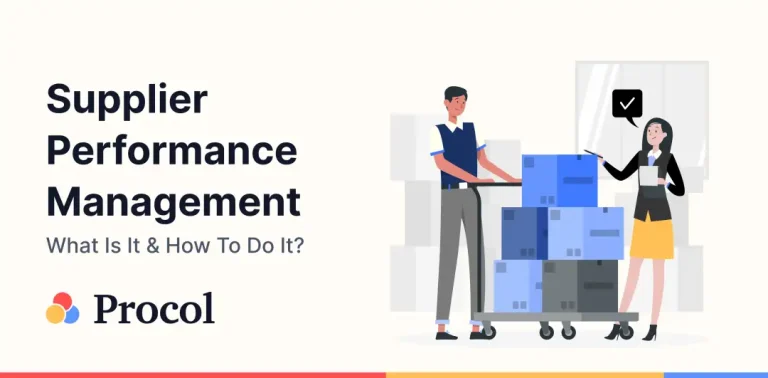
For many businesses, supply chains stretch beyond geographical boundaries and industries. This makes the role of suppliers pivotal. Suppliers can significantly impact the success of an organization.
Imagine if one of your critical suppliers fails to meet a delivery deadline, causing a ripple effect across your supply chain. The domino effect of this seemingly slight glitch is not just operational; it’s financial, reputational, and perhaps, for some, even existential.
To ensure the efficiency and effectiveness of suppliers, and to optimize the procurement process, it is important for organizations to proactively manage suppliers and analyze their performance. This is where supplier performance management comes into the picture.
What is supplier performance management?
Supplier performance management is the systematic and strategic approach through which organizations evaluate, monitor, and manage the performance of suppliers throughout the supply chain. This involves, not just, assessing the quality of goods or services provided but also taking into consideration various other factors, such as adherence to timelines, compliance with regulations, reliability, stability, flexibility, etc. The goal of supplier performance management is to establish a mutually beneficial relationship between the organization and its suppliers.
What is the role of supplier performance management?
The primary role of supplier performance management is to optimize the relationship between buyers and suppliers.
Supplier performance management also helps to:
- Provide a clear picture of supplier capabilities through a data-driven approach
- Foster transparency and promote collaboration through regular feedback mechanisms
- Ensure that terms are clearly defined and adhered to
- Proactively manage risks and address potential disruptions
- Continuously drive improvement and elevate the overall performance of the supply chain.
Why is supplier performance management important?
Suppliers can potentially put your entire supply chain at risk. This makes supplier performance management extremely crucial. Implementing a robust supplier performance management system yields a plethora of benefits.
Here’s why supplier performance management is important:
1. Operational Efficiency
Supplier performance management enables organizations to identify inefficiencies in the supply chain and take corrective measures. This results in streamlined processes, reduced lead times, and ultimately, enhanced operational efficiency.
2. Risk Mitigation
A supply chain goes through many uncertainties and shifts. A robust supplier performance management framework acts as a shield, helping organizations to identify and mitigate potential risks associated with their suppliers. This proactive approach safeguards against disruptions and enhances the overall resilience of the supply chain.
3. Cost Optimization
Suppliers play a significant role in determining the cost structure of a business. Through effective and continuous supplier performance monitoring, organizations can identify opportunities for cost optimization, negotiate better terms, and streamline processes. This not only improves the bottom line but also ensures that resources are efficiently utilized.
4. Quality Assurance
For businesses, maintaining consistent quality is a non-negotiable. Supplier performance management provides the tools to evaluate and ensure that suppliers meet or exceed the specified quality standards. This, in turn, safeguards the reputation of the brand and enhances customer satisfaction.
5. Strategic Alignment
It is important for suppliers to not just fulfill orders, but align with the strategic goals of the organization. Supplier performance management facilitates this alignment by ensuring that suppliers are not just vendors but strategic partners contributing to the long-term success of the business.
6. Innovation and Continuous Improvement
Suppliers are often a source of innovation. Supplier performance management empowers organizations to tap into the expertise of their suppliers, driving continuous improvement and staying ahead in a competitive landscape.
Supplier Performance Management vs Supplier Relationship Management
Supplier performance management and supplier relationship management are complementary approaches that help in a balanced and effective supply chain management.
| Supplier Performance Management (SPM) | Supplier Relationship Management (SRM) |
|---|---|
| SPM primarily focuses on improving the performance of suppliers based on agreed upon KPIs and performance metrics, such as quality, delivery, cost, compliance, etc. | SRM is a holistic approach that focuses on maintaining long-term and strategic relationships with suppliers that are mutually beneficial. |
| SPM regularly monitors supplier performance and suggests improvement plans, if necessary. | The purview of SRM is broader and includes joint business planning, risk management, innovation, collaboration to achieve common objectives. |
| With SPM, you can identify areas of improvement, strengthen supplier capabilities, and ensure that suppliers consistently meet the company’s requirement | SRM helps build agility, resilience, innovation, and risk management in the supply chain. |
How Do You Measure Supplier Performance?
The most common way to measure supplier performance is through a scorecard system with predefined KPIs. This structured approach provides a quantitative assessment, making it easier to identify improvement areas.
Other ways to measure supplier performance include:
- Regular audits and assessments for evaluating a supplier’s processes, quality control mechanisms, adherence to compliance standards, and getting in-depth insights into the supplier’s capabilities.
- Feedback and surveys gathered from internal stakeholders and end-users regarding their experiences with suppliers.
- Technology-enabled monitoring systems and supplier performance management tools, such as supplier evaluation software or supplier performance management software, that provide real-time visibility into supplier performance management kpi. Supplier performance management software can automate data collection and analysis, thereby enhancing efficiency.
Essential supplier performance management kpi and metrics:
While supplier performance management KPIs can vary depending on the nature of your business and the industry, here are some common parameters for measuring supplier performance:
- Quality
- Cost
- Delivery and service
- Contractual and regulatory compliance
- Flexibility
- Financial stability
- Quantity
- Innovation culture
- Communication
- Certifications
- Payment methods and terms
- Value additions
Supplier performance management process: Goals and strategies
- Quality assurance: Suppliers to meet or exceed predefined quality standards.
- On-time delivery: Timely delivery to prevent disruptions in further processes.
- Cost efficiency: Optimize cost-effectiveness for better operational efficiency.
- Compliance and risk mitigation: Adherence to contractual agreements and industry regulations to mitigate legal risks.
Continuous improvement and innovation: Process improvement for mutual growth.
Supplier performance management process: Best practices
Supplier performance management best practices can help you transform your supplier relationships into strategic partnerships while aligning your supply chain with business goals and creating a culture of continuous improvement.
Supplier performance management is not just a process; it’s a journey. Here’s how you can get started and unlock the full potential of your supply chain:
1. Define performance objectives and expectations: Align your supply chain with business goals
- Align supplier objectives with your organizational goals to create a symbiotic relationship that benefits both parties. Ensure that supplier performance objectives align not only with operational needs but also with your organization’s values and ethical standards.
- Clearly define supplier performance management kpis and communicate them transparently to suppliers. This clarity sets the stage for effective measurement.
- Include risk mitigation objectives in your performance expectations. Collaborate with suppliers to develop contingency plans, ensuring resilience in the face of uncertainties.
- Regularly reassess your business goals and ensure that supplier performance management KPIs remain aligned.
2. Collect performance data for informed decision-making
- Supplier risk and performance management software go hand-in-hand. Implement comprehensive data collection systems that cover all relevant performance metrics. This ensures a holistic view of supplier performance.
- Embrace real-time data-capturing mechanisms. Technology solutions, such as supplier relationship management (SRM) systems or supplier performance management software, provide timely insights into supplier activities.
- Conduct regular audits to validate and verify the accuracy of the performance data.
3. Measure and analyze performance through supplier performance analysis:
What is Supplier Performance Analysis?
Supplier performance analysis is the microscope through which you inspect and interpret the data collected during the measurement phase. It goes beyond numbers, offering a nuanced understanding of how suppliers contribute to overall organizational objectives.
Key components of supplier performance analysis:
- Data Interpretation
- Root Cause Analysis
- Comparative Analysis
- Risk Assessment
- Strategic Alignment
4. Take action: Transforming insights into strategic initiatives
- Taking actions based on insights gained from supplier performance analysis is the foundation for improvement.
- Set up a feedback loop with suppliers. Present performance insights, discuss areas for improvement, and collaboratively work towards a solution.
- Leverage technology for interventions, automation of vendor management, artificial intelligence, and data analytics tools can provide real-time solutions to performance issues.
- Implement incentive programs to recognize and reward high-performing suppliers.
5. Continuous improvement through supplier performance monitoring
What is Supplier Performance Monitoring?
Supplier performance monitoring is the continuous, real-time observation of supplier activities to ensure they are aligned with predefined performance expectations. It alerts you to discrepancies and enables timely interventions.
Key components of supplier performance monitoring:
- Real-Time Data Tracking: Track and monitor supplier performance in real-time including delivery schedules, quality metrics, and any deviations from agreed-upon terms.
- Alert Systems for Deviations: Implement alert systems that trigger notifications when there are deviations from expected performance for proactive intervention and timely resolution.
- Continuous Communication: Maintain open channels of communication with suppliers.
- Dynamic KPIs: Adjust KPIs dynamically based on evolving business needs and market conditions.
- Performance Dashboards: Utilize performance dashboards that provide a visual representation of key performance metrics. These dashboards offer a quick overview of supplier performance management kpis and highlight areas requiring attention.
Challenges in supplier performance management and how Procol addresses them
While supplier performance management benefits are substantial, implementing effective supplier performance management is not without its challenges. However, with Procol, an innovative AI-powered solution, many of these challenges can be successfully addressed.
Let’s delve into the common challenges in supplier performance management and explore how Procol provides solutions:
| Challenges | Procol’s Solutions |
|---|---|
| Limited visibility into supplier lifecycle | Procol offers real-time visibility, providing a holistic view of the supplier lifecycle. The AI-powered platform ensures that information is continuously updated, enabling organizations to make informed decisions promptly. |
| Data fragmentation and lack of a centralized repository | Procol acts as a centralized repository, consolidating all relevant information in one location. This streamlines data management and ensures data consistency. |
| Limited access to comprehensive reports and audit trails | Procol provides easy access to a full audit trail, reports, and checklists. The AI-driven analytics enable quick and accurate reporting, empowering organizations with valuable insights to enhance decision-making processes. |
| Inefficient supplier onboarding and deboarding processes | Procol streamlines supplier onboarding and deboarding, automating repetitive tasks and ensuring a seamless transition. This efficiency minimizes delays and enhances collaboration between departments involved in the process. |
| Challenges in reducing supplier risks | Procol empowers organizations to reduce supplier risks by providing flexibility to block them in the system. The AI algorithms continuously assess risk factors, enabling swift responses to potential issues, thereby safeguarding the supply chain. |
| Ineffective supplier scorecards and due diligence | Procol ensures the accuracy of supplier scorecards and due diligence with its performance tracker. Automated updates and real-time data contribute to more reliable assessments, facilitating better decision-making. |
| Communication gaps impacting supplier relationships | Procol includes integrated communication features, fostering strong and transparent relationships with suppliers. This ensures effective collaboration, reduces misunderstandings, and strengthens the overall buyer-supplier relationship. |
Conclusion
Supplier performance management solutions are not one-size-fits-all but a dynamic and evolving process that requires strategic thinking, collaboration, and adaptability. By understanding the significance of supplier performance management, organizations can build resilient, cost-effective, and collaborative supply chains that contribute to long-term success in a competitive business landscape.
Schedule a Demo
Explore more from Procol
Discover expert tips, how-to guides, industry insights, and the latest procurement trends.
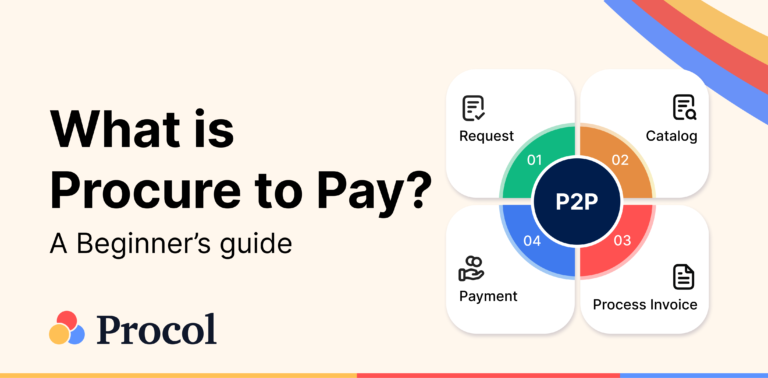
What is Procure-to-pay (P2P)? An Ultimate Guide
Procure to pay is the process from procurement of materials needed...
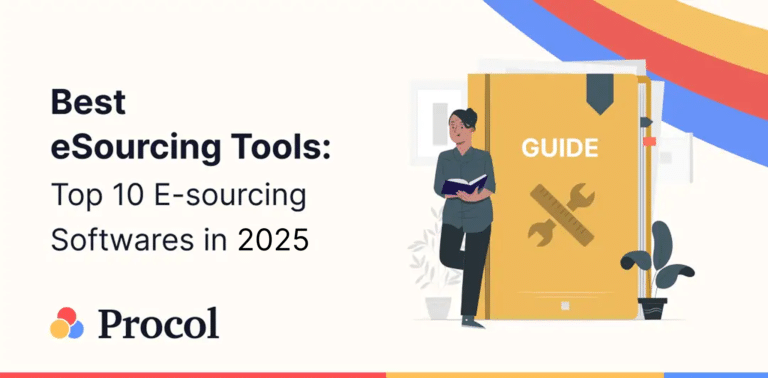
Best eSourcing Tools: Top 10 eSourcing Software in 2025
Discover top 10 e-sourcing tools and esourcing platforms necessary for efficient...
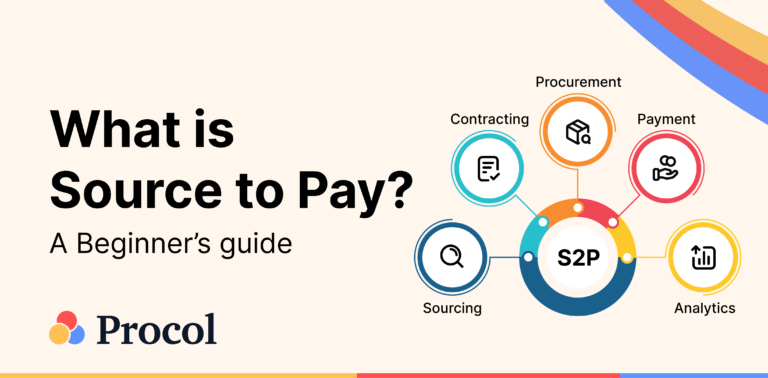
What is Source-to-pay in 2025? An Ultimate Guide
Source to pay is the process of sourcing vendors to procure...

